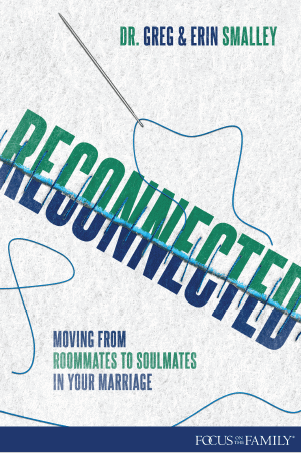Excerpt:
Erin Smalley: The- the truth is, is that most couples when they get married, you know, they’ve been hard after pursuing each other and so their focus is directly on one another. And then they- they conquer, they get married and then many other things start to take their eyes off of each other. You think about, you know, work and kids and just the pursuit of this new life. And that’s what I was saying to Greg, is that our eyes have not remained on each other. It’s been this slow fade of we went from absolutely pursuing each other wholeheartedly to pursuing many other things wholeheartedly.
End of Excerpt
John Fuller: That’s Erin Smalley and she’s with us again today along with her husband, Dr. Greg Smalley. And this is Focus on the Family with Jim Daly. Thanks for joining us, I’m John Fuller.
Jim Daly: Uh, John, we started a great conversation with Erin and Greg yesterday on how couples so often after we get married, begin to feel more like roommates. Uh, growing apart in marriage is something that happens almost naturally if you don’t make your relationship a priority. And we’re not talking about a full-blown crisis, uh, you’re just kinda going through the motions of work and kids and all the things that are going on. And pretty soon, it’s just a- a business you’re running, right? Home economics. Um, but we want to uh, encourage you to do it differently. The way God intended it to happen and that’s to connect at all levels. Emotionally, spiritually, physically, and uh, and how to prime the pump to make sure that can happen. If you’re feeling like your marriage could use a new spark or that you uh, need to regain some ground with your spouse, you’re gonna wanna lean in today.
John: Yeah, we have a- a great conversation that started last time and I’ll encourage you to swing by the website for the CD or listen there. Or, uh, to get the app so you can listen on the go. Um, we talked with Dr. Greg Smalley and Erin Smalley about a variety of things and um, I’m sure we’ll recap that in a moment. Let me just say, they’ve written a number of books. It’s always great to have them here um, as Greg said yesterday, we let them out of their offices to come into the studio, ’cause they head up the marriage effort here and um, they really make a big difference, uh, in that realm. Uh, the book that we’re talking about today is called Reconnected: Moving from Roommates to Soulmates in your Marriage. And we do have that. Uh, contact us for a copy. Our number is 800, the letter A and the word FAMILY. Or online, focusonthefamily.com/broadcast.
Jim: Greg and Erin, welcome back.
Erin: Thanks for having us again.
Dr. Greg Smalley: Yeah, we’re excited to be here.
Jim: Well, let’s uh, recap for those that are just joining us. And if you missed the conversation last time, get the download, uh, get the app for your smartphone so you can listen anytime. Uh, why is it so easy for married couples to drift apart and start to feel like roommates?
Greg: I think we put so much effort and energy into courting, dating, winning her, putting that ring on her finger. What we notice is that oftentimes when we accomplish that, then our- our focus changes to all these other things. So uh, figuring out jobwise, career-wise, having kids, staying involved with friends and family. All these things cry for our attention and there begins then, a- a slow fade.
Jim: Yeah.
Greg: You know, we- we date and everything to get married. It happens fast but then over time it’s just this slow fade that we don’t notice.
Jim: Erin, let me ask you this on behalf of moms. And, you know, I see this in Jean. Um, especially when the boys were young. There’s this uh, zeal and, you know, it can be either a mom or a dad, but I think it generally fits with mom. Where the justification that I- this is the time I really need to be pouring into the kids, you know and uh, I just don’t have enough time for you. You can really rationalize that on a good basis. You know, the kids are two, three and five.
Greg: And very demanding.
Erin: Mm-hmm (affirmative)-.
Jim: Very demanding and I’ve gotta be there for them, honey and I’m sorry I’m just not, you know, I’m not gonna be there that often for you. Whatever that means. Emotional connection, talking-
Greg: Yeah, you’re a big boy, you can take care of you.
Jim: So, I just- I wanna play that out a little bit because I think that’s one of the core, especially in that season of life-
Erin: Mm-hmm (affirmative)-.
Jim: A- a mom particularly can really justify I’m gonna be ignoring you for a while, so we’ll check back in later.
Erin: Yeah, it just- that just won’t work, and I think our culture just feeds that. You know, these kids, uh they are important, they’re a blessing. But they are not the center of the world. The marriage- the stronger the marriage is, the better it is for those kids. And so, the greatest thing that mom can do, and again, it’s like we talked about yesterday, it’s not that we have to spend 24/7 focusing on our husband, it’s-
Greg: Although I wouldn’t mind, I’m just saying.
Erin: (laughs)
Jim: (laughs)
Greg: It’s okay.
Erin: You would have plenty of needs that I could address.
Greg: (laughs)
Erin: But it’s looking at that there’s certain things that we can be doing to continue to build the connection between- between Greg and I, between your spouse and you.
Jim: Yeah.
Erin: It’s important because that is the healthiest thing you can do for your kids.
Jim: Well, and so often in this culture and in this modern time, there’s so much fear that if mom, again, feels like she’s dropped the ball somewhere that somehow kids will be permanently damaged.
Greg: Yeah.
Jim: Kids are resilient, they’re gonna get through a little loneliness, they’ll get through a little neglect. I mean, I’m talking the normal stuff, you know.
Erin: Yeah.
Jim: Make sure they’re fed, and they sleep.
Erin: (laughs)
Jim: But I’m just saying they don’t need you all the time.
Erin: Yeah, but- and honestly, when they see- they’re little eyes see mom and dad connecting, it breeds security and safety in their hearts.
Jim: Yeah. Think of that.
Erin: And that’s something powerful.
Jim: But uh, we mentioned lightly last time, this idea of communication and the impact on marriage. So, let’s get to that one. You suggest there are four significant conversations. This is where you want everybody, the pen and paper. Um, that spouses need to have, those c- those four core conversations. What are they?
Greg: Yeah, people, when they say, “We just need better communication.”
Jim: (laughs)
Greg: Well, that involves a lot of-
Jim: We’re talking to husbands here.
Greg: Right. One of them we call small talk and people often pooh-pooh that one. Like, “Oh, that’s at a surface level-”
Erin: Not Smalley talk.
Greg: (laughs)
Erin: Small talk.
Jim: Yeah, good, good.
Greg: That’s when we’re just checking in. How’d your day go? What’s going on? Here’s the weather, what’s… It’s- it’s small talk. What it does is it creates a small connection without the exhaustion of the deep, emotional connection.
Erin: Yeah, and then-
Greg: You need that small talk.
Erin: There’s work talk and that’s more, you know, the business of running the family. The administration of the family and the marriage. And of course, that’s important, we need to do that, we need to look at our budget and our finances and our schedules. But again, a marriage can’t exist only on that.
Jim: Mm, that is so good.
Greg: Yeah, and then there’s gonna be times where we hit conflict. So, we’ve gotta work through the conflicts. We just call that problem talk. So, there’s some issue that we need to work through and that’s important, instead of sweeping problems under the rug, let’s deal with it. Here’s what we’ve noticed, here’s the problem. Those three: small talk, work talk, problem talk, those happen naturally. You actually really don’t need to force those to take place. It’s just a normal part of being in a relationship. But if that’s all you’re doing, you are killing your marriage.
Jim: Well, you guys are counseling lots of people. How much percentage-wise, how much of a percent are couples just locked in those kinds of communication?
Greg: Locked in those three.
Erin: Yeah, what we find, 85% to 90% that-
Greg: I mean, think of that.
Erin: I know, that’s a ton of time. But the thing is, is usually they sit back and they’re shocked that that is what they’re doing. They don’t even realize what they’re doing because like Greg said, those three happen spontaneously. But the fourth one is the one that you have to intentionally pursue. And that’s that life-giving heart talk. The deeper level talk. And if you- you don’t do that, then, you know, it’s if you don’t pursue it, it’s not gonna happen.
Jim: Yeah, let me ask you. It’s so obvious, you see it in the research, you’ve described it, you put labels on it and yet our tendency in our humanness, in our brokenness, I would say as a Christian, we lean that way.
Greg: Yeah.
Jim: In the unhealthy direction. Or I should say the less productive direction.
Greg: They’re- they’re needed, those other types of communication-
Jim: Yeah, they’re needed.
Greg: They’re important-
Jim: But they’re not life giving.
Greg: They- they don’t bring life.
Jim: Yeah.
Greg: And that’s the difference.
Erin: Y- and they’re also not as vulnerable, so they’re not risking, they’re pretty safe. You know, we-
Greg: Well, that’s getting to the question, which is why?
Erin: Yeah.
Jim: Why do we go to the easy stuff and we don’t do the other stuff that is the stuff that the Lord would want us to talk about?
Erin: It’s more vulnerable, and it also takes intention.
Jim: Okay.
Erin: And I don’t think we understand that when we’re dating and we’re engaged, we are doing that naturally because we’re so locked in and focused. And then we- we train each other that well, maybe it’s not so safe to go to those deep places.
Jim: Yeah.
Erin: Because maybe it’s gonna lead to conflict and disconnection. One of the number one human needs that we have, is we long to be known and to be valued and connected. And so it’s- it’s vulnerable, there’s a lot at risk. And so, to recognize that if we build this safe place in our marriage, that we can intentionally go there. And the awareness of we need to intentionally go there.
Jim: Sure.
Erin: We did it all the time as we pursued each other wholeheartedly. There is no autopilot, we’ve gotta continue to pursue each other at that level.
Jim: Yeah. Now, you have developed four questions you ask each other, and I’d love to post those on the website so people can go. Because when I looked at all the content material, these really… They hit me and reminded me that I need to do this, frankly. (laughs) Speak to those four questions you ask each other.
Greg: Yeah, the point of the four questions was when I realized that- that we had to be intentional to have this life giving conversation, then I kinda went, “Okay, so how would I really do that?”
Erin: (laughs)
Greg: Like, “What- what does that mean?” So just asked Erin. I said, “Okay, if- if I’m gonna explore your inner life, so whatever’s going down a little bit deeper, wh- what could I ask you that would be meaningful?” And instantly she goes, “Oh, I got four. Ask me how I’m feeling, so how am I doing emotionally, okay? Ask me how things are going between me and our children, but not from an administrative standpoint.”
Jim: A relational standpoint.
Greg: A relational standpoint. Um, her female friendships are very important to Erin, so she said, “Ask me how things are going between me and my girlfriends.” And then this last one, I love. She said, “Ask me one thing that God’s been teaching me as of late.” Well, I tell you what, I have locked those into my brain so anytime that we’re, you know, commuting to, you know, a kid’s practice or sitting in a- in a- the stands, you know, as they’re playing, or at dinnertime or wherever, I- I’ll just ask one.
Jim: Okay, then you have to listen.
Greg: Well, that’s implied.
Jim: If you don’t, you’re in big trouble.
Erin: Yeah, and the propensity is to wanna fix it if there’s a problem, or you know, let’s delve into, you know, if we did A, B, C and D, well then that wouldn’t be happening, you wouldn’t feel like that. But it’s just recognizing you’re just listening.
Jim: Yeah.
Erin: And trying to understand and caring about what they’re going through.
Greg: Well, as guys, we need a goal. So, here’s the goal. So I ask her those questions simply to stay updated-
Jim: Yeah, that’s good.
Greg: In what’s going on in her life. I wanna stay current.
Jim: No, that’s good. Now, Erin, you have four that are different-
Erin: Yes.
Jim: From Greg that you ask him.
Erin: Yeah.
Jim: What are they?
Erin: Yeah, because if I started with how are you feeling, he might just go blank and-
Greg: Fine.
Erin: Yeah.
Greg: (laughs)
Jim: And- and the point is you can create any.
Greg: Yeah.
Erin: Yeah.
Jim: What’s gonna work in your marriage.
Erin: Yes, and that’s-
Jim: But these are good ones.
Erin: Yes, so I’ll ask him when he- when he comes home after a long day, um, we’ll sit and we’ll have our 10 minutes together. What was the high of your day? Okay, what was the low of your day? You know, what is- what is stressing you out, what is-
Greg: John Fuller’s name comes up a lot.
Erin: (laughs)
John: No!
Jim: This is good, I like this.
Erin: (laughs)
Greg: (laughs)
Erin: What is really, you know, weighing heavy, stressing you out at work and at home? And again, my goal isn’t to fix it or to try to make it better, it’s just to listen and to care and to know what’s going on inside of Greg. As well as, what’s God teaching you right now?
Jim: Huh.
Erin: We’re both, you know, into different things during the day and God is speaking to us through so many different modes. And so it’s fun to hear what God is teaching Greg.
Jim: Now, that is really good.
Greg: And- and let me… And- and again, remember, it started with me asking her, “To really get to know you, what would be meaningful to you to have me ask on a regular basis?” So, I mean, these- these are not prescripted like-
Jim: You’re right.
Greg: These are the four you need to ask.
Erin: Yeah.
Greg: We… As a matter of fact, and- l- we should put these on the show notes, which I’m now doing John Fuller’s job, so- so sorry.
John: (laughs)
Erin: Yeah.
John: Thank you for doing that.
Greg: (laughs)
Erin: That’s [crosstalk 00:12:19].
Greg: But we- we have created though, like hundreds and hundreds of questions that couples can ask. And you can link into that, download it. I’ve put these on my cell phone, so under the notes you can carry a copy in your car. I mean, get a little pdf. So, we- we’ve hundreds that’ll prompt as you look through them, what would be several that are meaningful?
Erin: Yeah, I print those off daily for couples. I’m like, “Here, you’re not talking. Take these, start here. See which ones work for you.” Because a simple little question can lead to such a deep in-depth conversation.
John: Yeah. Well, we’re having some great conversation right now with Greg and Erin Smalley. This is Focus on the Family with Jim Daly. And um, we’re gonna encourage you to get a copy of the book that the Smalley’s have written called, Reconnected: Moving from Roommates to Soulmates in your Marriage. We’ve got that and some other great resources, including our free parenting assessment online at focusonthefamily.com/broadcast. Or call 800-A-FAMILY.
Jim: Uh, distractions you mention in the book uh, come into play in all this. What are some of those sacred moments you wanna uh, k- keep distractions from seeping into?
Erin: Yeah.
Jim: And how do we do it?
Erin: It’s easy to get distracted-
Jim: Yeah.
Erin: In our culture today because we’re running at such fast paces, we’ve got our cell phones. We’re constantly checking things and you know, scores and Facebook and on and on. And just realizing that when you’re doing other things, your eyes are not on your spouse. And there’s these sacred moments that we personally don’t want to miss that opportunity to connect. One of the biggest ones is- is when we go to bed. When we go to bed, pillow talk is a big thing that we can choose to lay there on our cell phones and some nights we do. When we’ve had a long, hard day and we just wanna veg, but then I miss out. I miss out on connecting with Greg and I don’t want to. I wanna connect.
Jim: Are you a night person, by any chance?
Erin: I am.
Jim: Okay. (laughs)
Erin: Yeah.
Jim: I’m going, “Greg, Greg, poor Greg.” (laughs)
Erin: (laughs)
Greg: I’m ready for bed at 8:30 and it seems to be getting earlier.
Jim: Jean… You and Jean are the same and I lay down in bed, it’s not time for talk. (laughs)
Erin: Yeah, but-
Jim: This is a bed, it’s time for sleep.
Erin: (laughs)
Jim: (laughs)
Erin: But uh, what I have found, is I am a night person and so I could stay up a whole lot later. But because Greg goes to bed early and I want that connection, I go to bed early now. So-
Jim: Oh, that’s nice.
Erin: It’s helpful.
Greg: Oh, it- it’s the funniest thing. So, we agreed, listen, I know that you would much rather stay up. Why don’t you just come to bed? Let’s- let’s have 10, 20 minutes of just lying together joking, talking, being intimate and then y- you can leave.
Jim: (laughs)
Greg: Seriously. There’s been times, like I’ll never forget the time (laughs) that we went to bed. I thought we both went to bed. I got up the next morning, walked down, because I get up earlier than Erin, and there was a table that had been built-
Jim: (laughs)
Greg: That wasn’t there the night before. (laughs)
Greg: I’m thinking are there elves?
Erin: It wasn’t just a table.
Jim: It’s not just a table.
Erin: It just wasn’t a table; it was six chairs too. (laughs)
Jim: (laughs)
Greg: And it so freaked me out, I’m like, “Did someone break in not to steal, but to construct?”
Erin: (laughs)The hilarious thing is my girlfriend came over too and helped me. (laughs)
Jim: (laughs)
Greg: Sound asleep. So, Erin and I connected and she’s got this whole other life after I fall asleep.
Erin: Party going on after you’re in bed. (laughs)
Greg: But seriously though, all joking aside, for a lot of couples, they are on such different schedules like that.
Jim: Yeah.
Greg: That- that for them just to know start off in bed together. Doesn’t mean that you have to both stay in bed. You can get up and work.
Jim: Well, what I’m hearing you say is accommodation. You know.
Greg: Yeah.
Jim: You gotta make some accommodation. Don’t be hard hearted about no, I go to bed at 9:00 and we’re not changing, you know-
Greg: Yeah.
Jim: That kind of thing. Let me move to perhaps one of the most important… I think it is the most important area. And that’s developing spiritual intimacy with each other. Um, that can in the face of busy schedules and all the pressure, that can be one of the first things to go. That you’re not reading the word together, you’re not praying together. You know, so many people I talk to, particularly wives, will say, “I yearn for that. I just don’t know how we’re gonna do it. My husband’s so busy. He’s out the door so quick and…” But speak to the importance of that.
Greg: It’s so important to connect soul to soul. We’ve talked a lot about connecting heart to heart to- to that deeper kind of inner life conversation. But our souls need to connect. We need to connect spiritually. As a young husband, that was so intimidating for me. I saw some absolute spiritual powerhouses in my dad and some mentors and the way that they would do that was so intimidating that it so shut me down. I’d get so discouraged and Erin would feel disconnected. And one of the things that I now share with young husbands is, listen, just narrow this down to just a couple things. Which is how about this? Every day, pray with your wife. That might be early in the morning when we have- sit down for some coffee and have five minutes or whatever. It might be at night, as we’re laying in bed together.
Jim: Good goal.
Greg: But- but pray together. And that even can be intimidating. And so what- what I’ve learned to do with Erin, is I simply just say, “Hey, what’s one thing that I can pray for you about that’s going on tomorrow?” What I love is, she’ll answer it and I’ll go, “I didn’t…” Think in my mind, “I had no idea she was facing that tomorrow.” (laughs) So there’s a way even that it keeps you current.
Jim: Mm-hmm (affirmative)-.
Greg: And so just say, “What’s one thing that I can pray for you about?” And join hands and- and do that. She does the same and- and you have this quick prayer time. It doesn’t have to be 20, 30 minutes and include the Lord’s Prayer and all these things. Just, how can I be praying for you? That so unites us. That’s a daily goal. And then I encourage husbands, have a weekly goal to attend church together, ’cause the researchers show that if you’re praying together and going to church, that so makes a difference in your marriage. So, go to… attend church together and then join some sort of small group so that you are around like-minded couples-
Jim: Right.
Greg: Who also value marriage. Who value connecting and can help and fight for your marriage at times. And-
Erin: Mm-hmm (affirmative)-
Greg: And those three things; pray together, attend church and be a part of a community experience. So, a Sunday School class or small group, that’s how we can really strengthen our shared spiritual relationship.
Jim: And you know, Greg, there’s going to be a portion of the audience listening and they’re going to say, “That- You know, that’s a good idea. We need to do that.” It’s a healthy response to your admonition.
Greg: (laughs)
Jim: There’s gonna be another uh, group of people where, you know, for all the reasons we talked about last time and today, their hearts are a bit cooler, there’s um, you know, I don’t know, there’s just a- a hesitancy, an unwillingness to go there. I’ve been wounded, it’s not a safe place for me, whatever it might be. So, I think the- the question is, if a listener is saying, “I wish I had that, but my heart’s closed,” if they’re honest with themselves. Or maybe they’re saying, “I think my husband’s or my spouse’s heart is closed,” how do they develop that safety in the marriage to begin to open up to these ideas in a- in a more accepting way? In a let’s do it kind of way-
Greg: Yeah.
Jim: Rather than it’s never gonna happen.
Greg: Which is so critical because that was one of the factors that contribute to people feeling like roommates, is that these- the marriage doesn’t feel safe.
Erin: Mm-hmm (affirmative)-.
Jim: Well, and I guess the question more clearly, is just the dimming of that light.
Greg: Yeah.
Jim: Rather than the- the light getting brighter.
Greg: Yeah.
Jim: Meaning your marriage and your connection, it just continues to dim.
Greg: Yeah.
Jim: How do we reverse that and create that sense of safety that we can try these things and be optimistic about them?
Greg: What I love is that God actually has given us a really simple formula. In the Book of Joel, in The Old Testament, there’s a verse that really stood out to Erin and I. We realized that it’s really the key to creating safety in a marriage. And the verse said, “Rend your heart.” So, he’s talking to the- to his bride, the children of Israel. He’s saying, “Rend your heart. Open your heart to me. Don’t tear your garments, don’t tear your clothes,” as they used to do as a sign of- of grieving because they’d made some mistake. He goes, “Listen, I don’t want your- your clothes torn. I want your heart torn back to me because,” and he lists four things that he is. That when Erin and I realized if- if we use those four things in our marriage, that’s what creates safety. He said that, “I am slow to anger,” so he’s talking about patience. “That I’m full of grace, that I’m abounding in steadfast love and I’m compassionate.”
Jim: Hmm.
Greg: And so if you just take those four things and go, “How do I learn to be more gracious, more full of grace? How do I give Erin grace in our marriage?” The more I do that, it makes her feel safe. What does compassion look like? How do I be more patient?
Jim: Yeah.
Erin: And so often, when we come up against a spouse that has a closed heart, we wanna bash through their walls and pry their heart open. And what does that cause? It causes them to feel more unsafe. So instead, I… What you’re saying Greg, is that we stand outside that wall and we show up in ways that are patient, that are gracious, that are kind. Because believe it or not, even when your spouse is closed, they’re watching you. And they’re watching around that wall to see how are you showing up out there?
Jim: Hmm.
Erin: And if it’s a safe environment, well then, it’s more likely that they might step out and take a step out towards you. So, it’s recognizing I can’t control if my spouse’s heart is closed or not, but I certainly have great influence in the overall environment of the relationship.
Jim: Yeah. Let me- let me ask you this question. You know, typically, again, uh, it won’t always be male, female. I don’t wanna get stuck in that trap. But oftentimes you have one or maybe both in the- the marriage relationship where being right is really important. You know, just- it just is part of perhaps your childhood when you were brought up. But y- you- you’ve gotta correct people, especially your spouse. (laughs)
Greg: Yeah.
Jim: You know, you gotta be right. How- how do you fight that appetite to correct and to have to be right?
Erin: Yeah.
Jim: Does that make sense?
Erin: Yeah. I actually talk about that a lot each and every day with couples that you know, you can do that. Certainly, you can do that, but is it gonna lead you to what you want? It’s gonna lead to this tug-of-war, this emotional tug-of-war that you know, I- I think it’s this way, I think it’s that. But it’s recognizing what I really want is that deep connection. And there’s two different people, two different perspectives and often what I say is, “I expect to hear that there’s two different ways of looking at it and both are valid.”
Jim: Yeah.
Erin: So how do we honor each other? How do we… We- we can offer suggestions, but you know, we can ask, “Hey, are you open to my feedback?”
Jim: Hey, uh, you- we have other elements there. You talk about dreaming together. We’re not gonna have time to get to that. That’s why people need to get a copy of the book. And you’ve done a wonderful job with this. But I do wanna end with that husband and wife who has been listening to the program today, maybe both days, and he or she is feeling that sense of brokenness in their relationship. They recognize uh, that there’s distance in the relationship, that they have grown apart. Um, and perhaps they’re lonely and scared, they don’t know how to, you know, connect back together. What’s something they can do today, tomorrow, uh, as a first step to get their spouse closer to them?
Greg: Yeah, I think one of the most powerful ways to do that is to pay attention to what- how your spouse is really feeling, to go after their emotions. I’m telling you that- that when Erin and I are really disconnected, if I just take a moment and just say, you know, “How- how are you really doing? T- talk to me about- about what’s going on for you.” Like this morning, I mean, we’ve had a lot going on. We- we met up for coffee and- and we just sat there. And it was such an easy thing just to do, just to… You know, tell me about what… How you really doing? And- and there’s something about pursuing Erin. And when I pursue her emotions that- that creates that connection, that creates that safety.
Erin: Mm-hmm (affirmative)-.
Greg: And so, it may be a really tough season and there’s so much that we could do and oh, we should be doing this and doing that. But just- just- just invite your spouse out. T- let- let’s just take a walk, let’s just go for some coffee. Tell me about how you’re really doing? That begins a different type of experience. It b- creates a small connection that- that they can build on.
Erin: Mm-hmm (affirmative)-.
Greg: And over time, you’re- you’re gonna feel more connected. It’s gonna feel awkward, weird in the beginning. But pursue each others’ heart, go after the emotions and watch what that does.
Erin: Yeah, and even as he was talking, the thing that was just going through my mind is, how safe that makes me to feel. To be pursued and to know that Greg wants connection with me. That’s a powerful statement to say to someone, especially your spouse. I wanna be connected with you, I value you. And I’ve noticed that these small foxes have- have creeped in and can we take a look and figure out what is it that’s causing our disconnection? Because I- I’m committed to you, I wanna be your best friend, and I’m- I wanna- I wanna walk this out. Can we take a look at it because I want that connection, it matters to me.
Jim: Well, and again, you guys have done a brilliant job with the book, Reconnected, and there’s so much more in here. And you know, again, as Christians particularly, if I could speak to you, the Christian couple. We’ve got to model this well. I mean, the Lord himself created the institution of marriage. And I think one of the- one of the reasons the culture is struggling is because we in the church too, have not done it as well as we should have. And we’ve gotta keep that in mind. That- that we’re honoring the Lord when we do well in our marriages, and it doesn’t mean you’re gonna be perfect. You’re gonna make mistakes, and we get that. I make mistakes. John, you may not.
Erin: (laughs)
Jim: (laughs) But um, the point is, uh, all the tools that you can muster to help you do the best job you can do. And I try to do that more now, to think that people are watching and how can I model my marriage in such a way that people want that? And that’s a good goal even if you’re not hitting it out of the park every day. Uh, contact us here at Focus. We are here for you, we want you to call. We have caring, Christian counselors who can help you. We have that great Focus on Marriage Assessment, five to 10 minutes, that’s all it’ll take. It’ll point out your strengths and your weaknesses. And then we have so many tools that can help you. And if your marriage is in a really bad spot, we’ve got Hope Restored, a four-day intensive that can take you to a better place. Post two-year survey work that we’ve done, 80% of those couples are married still and doing better. So, we have every resource you need to get this job done. And again, Greg and Erin, thank you so much for being with us.
Greg: Oh, our pleasure.
Erin: Yeah, thank you.
John: Yeah, call us to let us know how we can put some of these resources into your hands or serve you. Our number is 800, the letter A and the word FAMILY. 800-232-6459, or stop by focusonthefamily.com/broadcast.
Jim: And let me ask you, our listener, to join us in this ministry to couples and families. Uh, your regular support of Focus on the Family empowers us to provide solid, practical help to people who need it, with tools like Greg and Erin’s great book, Reconnected. And today, when you make a monthly pledge of any amount, we’ll send you a copy of that book to say thank you for standing with us and supporting the family. And if a monthly gift doesn’t work with your budget, we get it. We’ll send you a copy of Reconnected for a one-time gift as well. This content will help your marriage regardless of what season in and it’ll uh, allow you to move in a Godly direction.
John: Once again, our number: 800, letter A and the word FAMILY. On behalf of Jim Daly and the entire team, thanks so much for joining us today for Focus on the Family. I’m John Fuller, inviting you back next time as we once again help you and your family thrive in Christ.






















